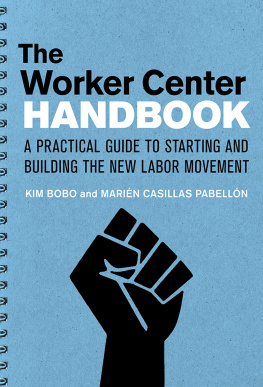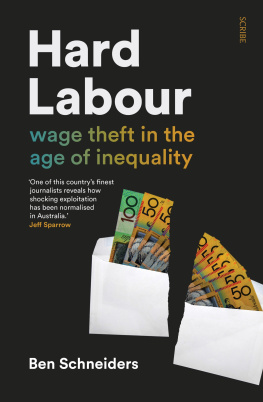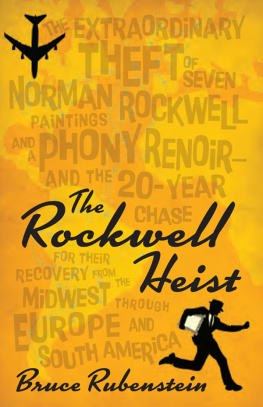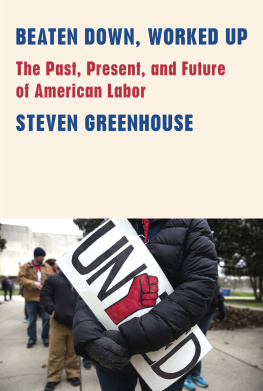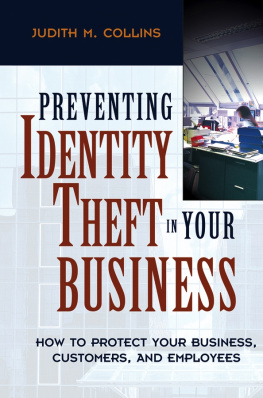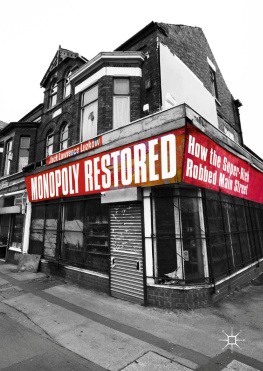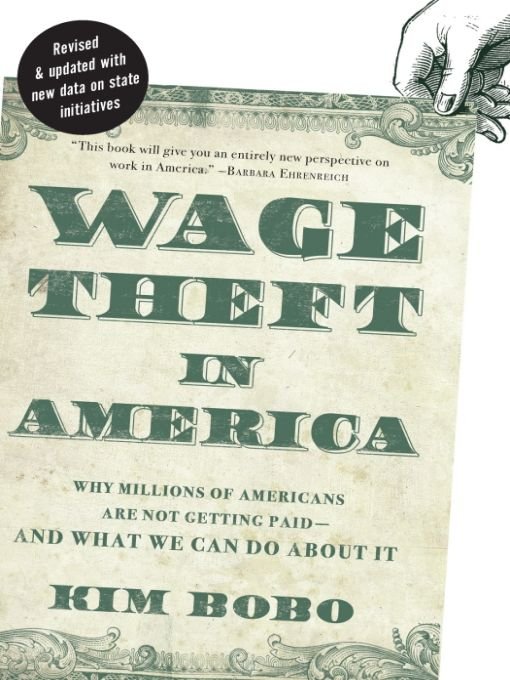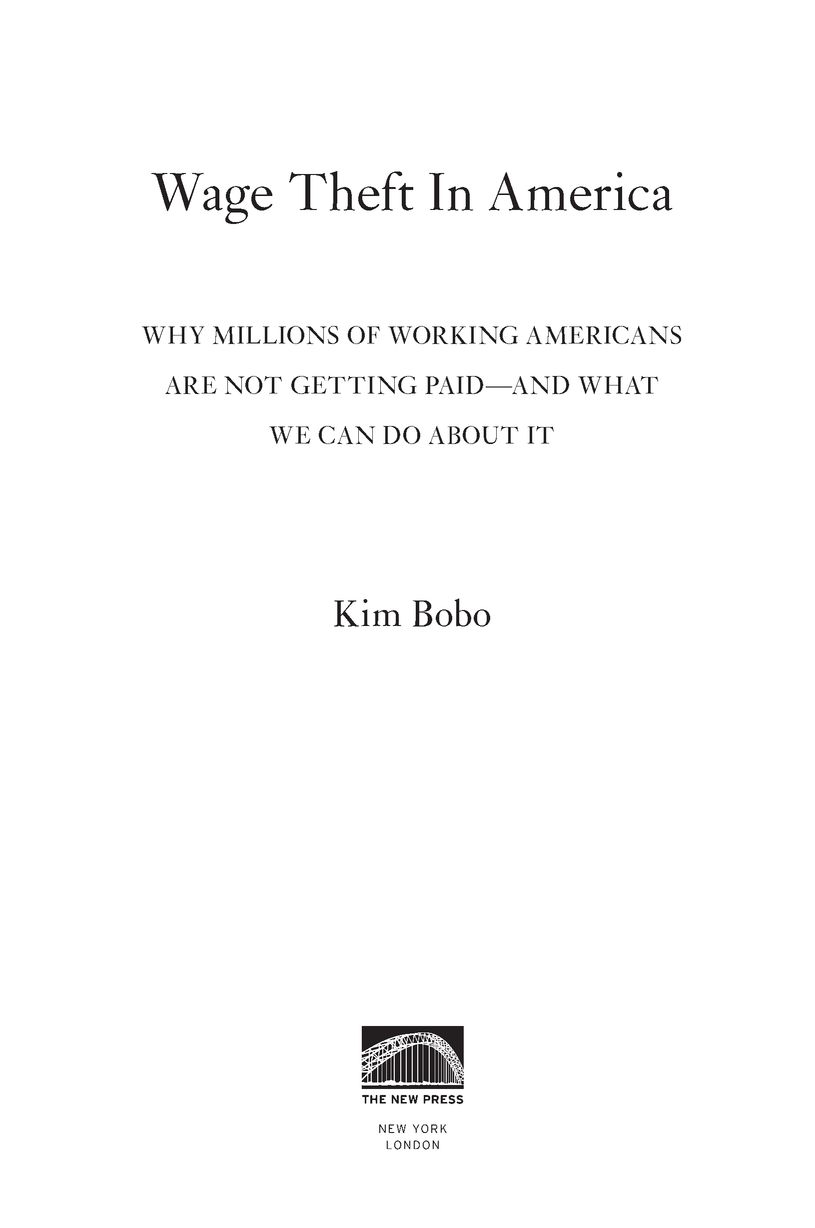Table of Contents
ALSO BY KIM BOBO
Organizing for Social Change: Midwest Academy
Manual for Activists
Kim writes a regular column for the IWJ print newsletter
Faith Works and online e-newsletter
(www.iwj.org)
Acknowledgments
This book is the product of many people, but especially the staff and leaders of the Interfaith Worker Justice (IWJ) affiliated workers centers. These centers are in the front lines of the fight against wage theft. The staff and leaders of these centers were generous with their stories, experience, and wisdom in both the first and this second edition. Thank you especially to Laura Boston, Martin Chartrand, Tiffany Crain, Fernando Garcia, Annica Gorham, Hamilton Gramajo, Patrick Hickey, Adam Kader, Anna Karawicz, Veronica Mendez, Pete Meyers, Dan Moore, Brian Payne, Alfredo Pena, Don Sherman, Rael Silva, Jeanette Smith, Garrett Stark, Marie Thompson, Abigail Thornton, and Cristina Tzintzun.
I am grateful to current and former Department of Labor leaders who shared their ideas for improvement of the agency and reviewed mine in order to weed out the really dumb ideas and correct many of my misunderstandings (any totally wild ideas and misunderstandings that remain are all mine and not theirs!). They were patient with my inquiries and open to new ways of doing things. Thank you especially to John Fraser, Rae Glass, Libby Hendrix, Michael Kerr, and Timothy Reardon.
Labor friends, advocates, policy experts, and attorneys offered key insights and directions. Jules Bernstein read every page of both editions with a careful editors eye. I am grateful for all the comments from Bruce Boyens, Jody Calemine, Matthew Capece, Johanna Chao-Kreilick, Janice Fine, Ariel Jacobson, Tom Kochan, William Lurye, Edith Rasell, Catherine Ruckelshaus, Gerry Shea, Michael Wilson, and David Weil.
Lots of friends and colleagues commented on drafts and improved the documents readability and focus. Thank you to Eric Boria, John Howard, Dean Lawrence, Kathryn Mitchem, Kelly Quakenbush, and Laurie White.
Thank you to the Twink Frey Visiting Social Activists Program at the Center for the Education of Women at the University of Michigan, which offered me a space away from work to think and write. Everyone at the Center was so kind and welcoming to me. Thanks especially to Beth Sullivan, who coordinates the Twink Frey Visiting Social Activists Program and Gloria Thomas, the Centers director.
I owe special thanks to all the IWJ staff members who took on extra work enabling me to take time in 2008 and then again in 2011. I am particularly grateful to Aina Gutierrez and Charese Jordan who served as joint acting directors in 2008 and Aina Gutierrez and Ted Smukler who juggled extra responsibilities in 2011. Ted also gave extensive comments on both drafts. My two beloved assistants, Cathy Junia in 2008 and Honna Eichler in 2011, protected me from e-mails and calls, arranged trips and calls for me, and helped me track down information, including Appendices A, B, and E. Anne Janks, coordinator of Can My Boss Do That (www.canmybossdothat.com), compiled an updated list of workers centers and legal clinics for the second edition. Other current and former colleagues, including Cynthia Brooke, Dianne Enriquez, Jose Oliva, and Danny Postel, gave meaningful content suggestions. Joan Flanagan helped proof the galleys. Thank you to the IWJ Board of Directors, led by Bishop Gabino Zavala, who supported my carving out time for the original writing and then the revision. In addition to Jules Bernstein and Edith Rasell, mentioned above, several board members were very helpful, including Charles Whitaker, who copyedited the first edition before I even sent it out to readers, Karen McLean Hessel (and her husband Dieter), who helped integrate the Scriptures, and Hussam Ayloush, Bob DeRose, Jeff Korgen, Linda Lotz, Mary Priniski, and Bennie Whiten who offered content suggestions.
The book was significantly improved by the stories, examples, and corrections offered by all these colleagues. Nevertheless, as someone coming to this work primarily out of concern for workers, as opposed to great legal skill, and trying to make the confusing array of workplace issues comprehensible, I suspect that despite my best efforts I have not explained something clearly, or perhaps have even gotten something wrong. Any errors or lack of clarity are my fault. If you find something confusing or you think something is incorrect, please let me know via the books website (www.wagetheft.org). Id also love to hear your stories of wage theft. Did you have wages stolen? If so, what did you do? Were you a manager or an employer, and did you find ways to stop wage theft in your company or in a subcontractor? If so, what did you do?
Thank you to Jennifer Phillips and Phil Tom for encouraging the Joyce Foundation and the Presbyterian Church USA to provide financial support for my writing time in 2008 and the Twink Fey Visiting Activists Program for the time in 2011.
Thank you to Marc Favreau at The New Press for pushing me to consolidate chapters and document the extent of the crisis and to Debbie Masi and Melody Negron at the Westchester Book Group for their careful production editing. Ellen Adler, Publisher of the New Press, has been a tireless supporter of the project.
And finally, thank you to my beloved husband Stephen Coats (who commented on the manuscript) and our twin sons Eric Coats and Benjamin Bobo for their overall support and encouragement.
Introduction
Thou shalt not steal.
Exodus 20:15 (KJV)
Americans understand that the nation faces a jobs crisis. We simply dont have enough jobs for all those who are willing to work. Most Americans also understand that we have an income and benefits crisis. There arent enough jobs that pay living wages with family-supporting benefits. Too many are without jobs. Too many with jobs dont get paid enough to make ends meet. Wages are stagnating. Health and pension benefits are disappearing. Workers rights to organize unions are under attack. There are many excellent books on these subjectsmy two favorites being Nickel and Dimed: On (Not) Getting By in America (2001) by Barbara Ehrenreich and The Big Squeeze: Tough Times for the American Worker (2008) by Steven Greenhouse.
Unfortunately, most Americans are shocked to learn that we also have crises of wage theft and payroll fraud. Unscrupulous employers are stealing money from workers by cheating them of wages owed or not paying them at all and lying to public agencies about having employees.
Since 1996, Ive had the honor and pleasure of leading Interfaith Worker Justice (IWJ; www.iwj.org), a national network that engages people of faith in issues and campaigns to improve wages, benefits, and working conditions for low-wage workers. We work with an awesome network of more than fifty religionlabor groups and twenty-five workers centers. Originally, IWJ had planned to work primarily with labor unions, because they are the best antipoverty and antiwage theft vehicles around. Unfortunately, we quickly realized that unions didnt exist in many communities and that their capacity to organize and represent workers in many low-wage sectors is not as strong as we would like.
As a result, we began developing and supporting workers centers, which are essentially drop-in centers for workers in low-wage jobs who are having trouble with wages or health and safety. Like the Catholic Labor Schools of the 1930s and 1940s or the farm worker service centers in rural communities, the workers centers train workers to understand their rights in the workplace and organize to improve their situations.


